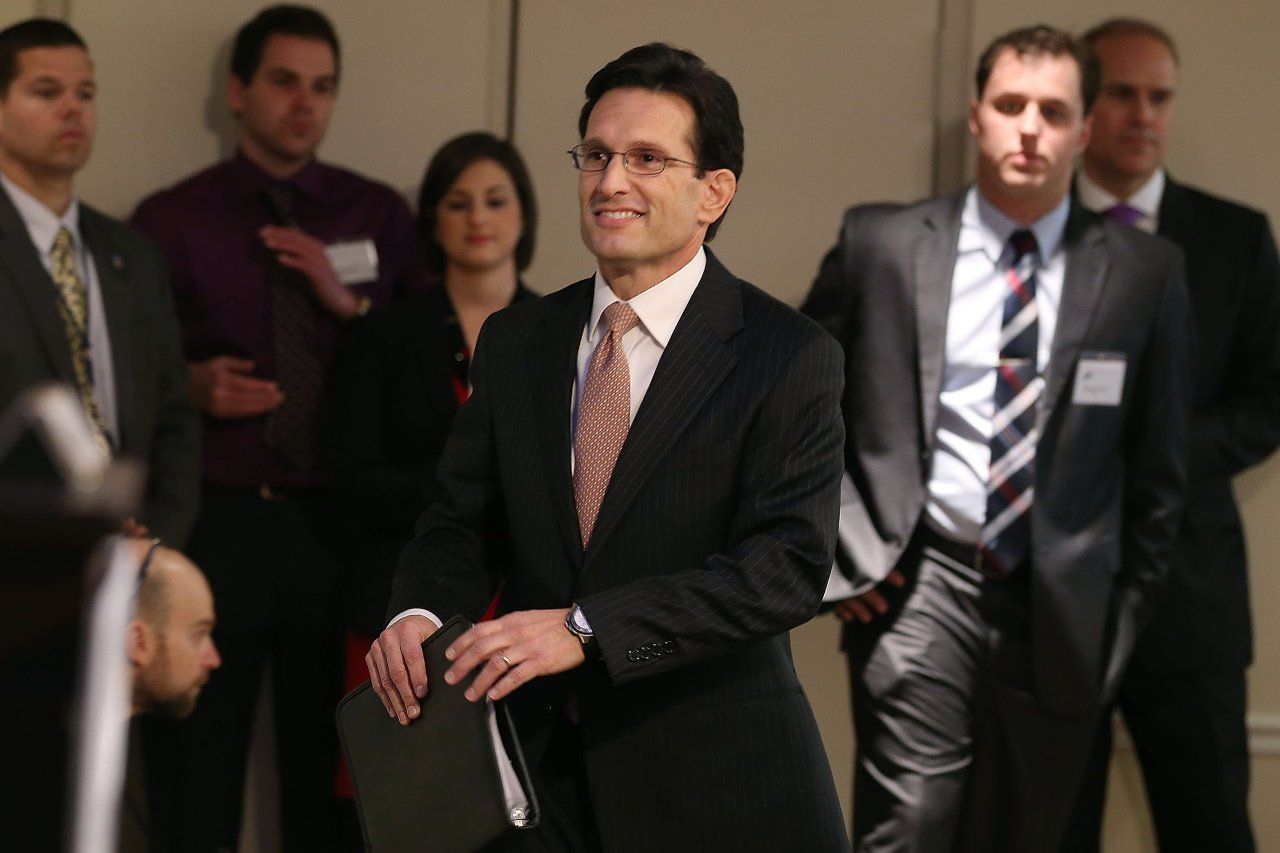
What lies between the Republican Party of today and the Republican Party of tomorrow? The Democratic Party of yesterday.
This week House Majority Leader Eric Cantor journeyed to the American Enterprise Institute to unveil a softer, cuddlier GOP. Over the course of his speech, he introduced several real-life folks whom he used as props to illustrate the challenges facing average Americans. As he moved from Joseph to Fiona to Erin, I kept having flashbacks. I remembered Mitt Romney in the first debate doing the same thing, talking about real individuals to counter the perception that he saw them as a whiny, resentful 47 percent mass. And then I remembered that both Cantor and Romney were really imitating Bill Clinton, the master of the ordinary-American maneuver, the undisputed heavyweight champion when it came to feeling your pain.
And that wasn't Cantor's only Clintonian gesture. In his speech, Cantor basically abandoned the core argument of the Obama-era Republican Party: that the federal government is too big and too expensive and is turning America into Greece, or North Korea, or both. Instead Cantor waved away that whole "cutting government" thing in his second paragraph and went on to discuss what Republicans will make government do for you once the "fiscal debates" of the moment are over.
Cantor's vision of what government will do is modest. He proposed requiring colleges to equip "prospective students with reliable information on the unemployment rate and potential earnings by major." (Somewhere Allan Bloom is cursing from the grave, in ancient Greek.) He suggested consolidating the 47 different federal jobs-training programs to "make it easier for Americans who are out of work or who are changing careers to get the skills they need." He called for allowing private-sector employees to "convert previous overtime into future comp time or flextime." He proposed making tax forms simpler. He urged more government funding to "find cures to diseases."
It's enough to make a Clintonite swoon. In the 1990s, with the public suspicious of grand government ventures and government too deep in debt to afford them, Bill Clinton launched microinitiatives like school uniforms and the V-chip. What Clinton was trying to do, in accordance with his vaunted Third Way between the big-government left and the anti-government right, was to find cheap, nonbureaucratic means to help ordinary folks manage life. Now Cantor, limited by his party's suspicion of government and the government's lack of money, is suggesting something similar. The only difference is that there was a stern moralism to Clinton's initiatives. To reassure those swing voters who still half-believed Richard Nixon's claim that Democrats were the party of "acid, amnesty, and abortion," Clinton put government on the side of discipline in schools and against porn on TV. Today the Republican Party's image problem is different: instead of moral disorder, Americans associate the GOP with plutocratic indifference. So Cantor's microinitiatives are designed to help Americans get more from their education, improve their health care, and spend more time with their family.
There's something absurd about skipping over the budget brawls of today, struggles that will shape the welfare state for decades to come, so you can talk about converting overtime into flextime. But in the tradition of Dwight Eisenhower and Richard Nixon, Cantor understands that the GOP must position itself as a bulwark against government overreach, not basic government-guaranteed security. Whatever you think of the specifics of Cantor's proposals, his basic instinct—to trim government spending without telling Americans they're on their own—is politically shrewd. It's no surprise that he's imitating both Nixon and Clinton in that regard, since Clinton himself once observed that fiscal constraints had turned him into the equivalent of a moderate Republican.
There's just one problem: simplifying job-training programs isn't sexy enough to capture the public's attention. Clinton's microinitiatives worked in solidifying his New Democrat reputation because he had already stared down his party base on high-profile, richly symbolic issues like the death penalty, welfare, and free trade. Cantor may have begun that process at AEI when he endorsed a path to citizenship for children living in the United States illegally. But to turn heads and make Hispanic voters, young voters, and female voters see the GOP anew, Cantor and, more importantly, the person his party nominates for president in 2016 will have to pick fights with their own side. They'll have to create something that can genuinely be called a New Republican. And they'll have to take the risk that when they do, the cheering from places like AEI will stop.
Uncommon Knowledge
Newsweek is committed to challenging conventional wisdom and finding connections in the search for common ground.
Newsweek is committed to challenging conventional wisdom and finding connections in the search for common ground.





